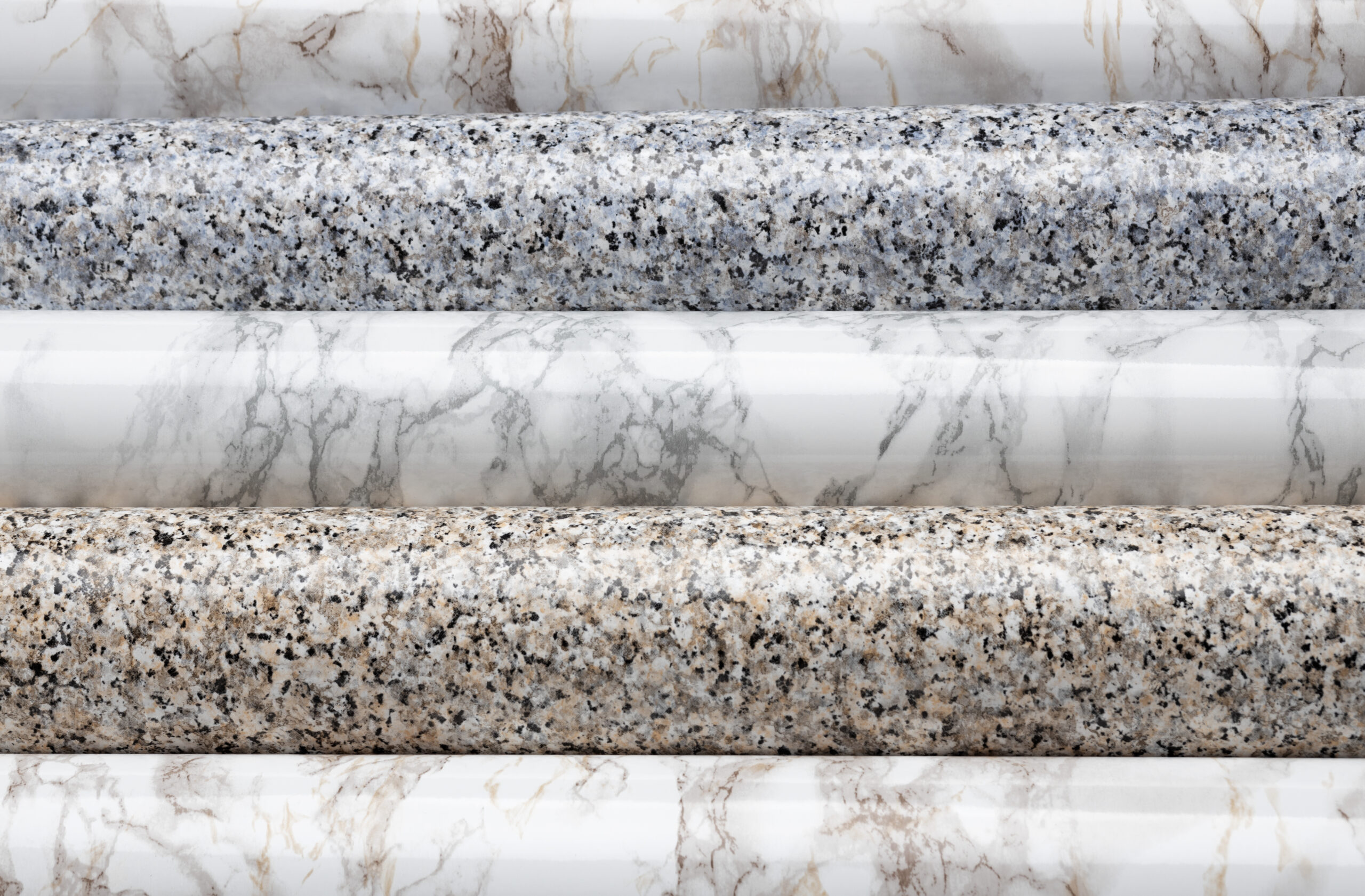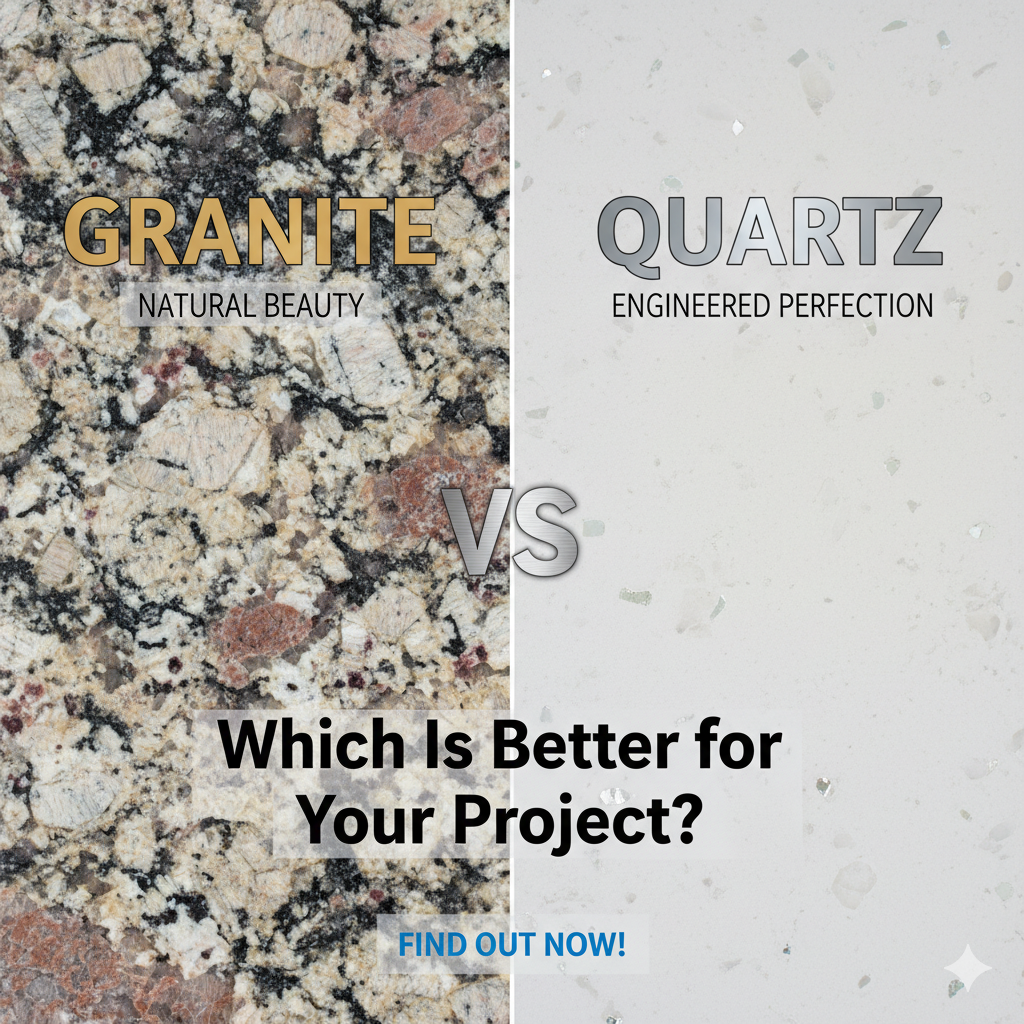Choosing the right countertop material can significantly impact the look, functionality, and value of your home. Among the most popular choices today, granite and quartz stand out as leading options for kitchens, bathrooms, and high-use areas. Both materials offer durability, elegance, and long-term performance, but they differ in composition, maintenance needs, and overall characteristics.
According to Global Growth Insights, the global granite market is projected to reach 19. 46 billion by the end of 2025 and is estimated to reach USD 25.89 billion by 2034, with a CAGR of 3.22%.
Business Research Insights gives a broader quartz stone number – USD 20.07 billion by the end of 2025 and is projected to jump to USD 72.16 billion by 2035 with a CAGR of 11.6%.
To help you make the best decision for your project, this guide compares granite and quartz across all key factors — from cost and durability to aesthetics and daily upkeep.
Table of Contents
ToggleWhat Is Granite?
Granite is a 100% natural stone formed from cooled magma deep within the earth. Each slab is unique, featuring natural patterns, minerals, and color variations. The stone is quarried, cut into slabs, polished, and then installed as countertops.
Key characteristics of granite:
- Completely natural
- Highly heat-resistant
- One-of-a-kind patterns and variations
- Requires periodic sealing
- Very hard and durable
Granite’s natural beauty makes it a favorite among homeowners who appreciate organic, earthy aesthetics.
What Is Quartz?
Quartz countertops are engineered stone surfaces, made from roughly 90–95% natural quartz crystals blended with resins, pigments, and polymers. Because it is manufactured, quartz offers a more controlled appearance, uniform texture, and wide color options.
Key characteristics of quartz:
- Engineered for consistency
- Non-porous and doesn’t require sealing
- Resistant to stains and bacteria
- Wide variety of colors and patterns
- Not as heat-resistant as granite
Quartz appeals to those who want a clean, modern, low-maintenance surface.
Granite vs Quartz: Side-by-Side Comparison
Below is a detailed comparison to help you determine which surface is best suited for your kitchen, bathroom, or commercial project.
1. Appearance & Aesthetic Variety
Granite
Granite’s biggest appeal is its natural, unique beauty. No two slabs are identical. This results in:
- Varied veining and mineral patterns
- Organic waves, speckles, and color shifts
- A timeless, luxurious look
Granite works beautifully in rustic, traditional, and nature-inspired spaces.
Quartz
Quartz offers controlled, uniform patterns created during manufacturing. This allows:
- Consistent colors across slabs
- Modern, minimalist designs
- Options resembling marble or concrete
Quartz is ideal for contemporary, sleek, or Scandinavian-style interiors.

2. Durability & Strength
Granite Durability
Granite is extremely hard and durable. It resists:
- Scratches
- Heat
- Normal wear and tear
However, its porous nature means it can absorb stains if not properly sealed.
Quartz Durability
Quartz is equally strong but has additional advantages:
- Non-porous
- Highly stain-resistant
- More flexible (less prone to cracking during installation)
Quartz cannot handle extreme heat as well as granite, as the resins may discolor or warp.
3. Maintenance Requirements
Granite Maintenance
Granite needs:
- Sealing once a year
- Immediate cleanup of acidic spills
- Mild cleaning solutions
Though not difficult, the sealing process adds a layer of maintenance not required with quartz.
Quartz Maintenance
Quartz is incredibly low maintenance:
- No sealing required
- Resistant to stains, bacteria, and mold
- Easy to clean with soap and water
4. Heat & Scratch Resistance
Granite
Granite handles heat exceptionally well — hot pans can be placed on it briefly without damage. It is also highly scratch-resistant.
Quartz
Quartz is scratch-resistant but not heat-resistant because of its resin binders. Hot pans can cause burn marks or cracking.
5. Cost
Granite Pricing
Granite prices vary based on:
- Rarity of the slab
- Thickness
- Origin
- Installation complexity
Prices can range from moderate to very high.
Quartz Pricing
Quartz is typically more consistent in price but can also be on the higher end depending on the brand or style.

6. Environmental Impact
Granite
As a natural stone, granite requires quarrying and long-distance shipping. However, it does not involve chemical resins.
Quartz
Quartz manufacturing requires energy, resin, and pigments, but many brands use:
- Recycled materials
- Sustainable production processes
Which One Should You Choose?
The right choice depends on your priorities:
| Choose Granite If You Want | Choose Quartz If You Want |
| A natural, one-of-a-kind stone | A low-maintenance surface |
| High heat resistance | Uniform patterns or modern styles |
| A timeless, organic look | Superior stain resistance |
| A material that can handle heavy use | A hygienic, non-porous countertop |
In summary, granite is perfect for the natural-stone lover, while quartz is ideal for someone wanting durability with minimal upkeep.
Check out our blog on Granite vs Quartz Countertops for more details.
FAQs: Granite vs Quartz
1. Is granite or quartz more durable?
Both are extremely durable, but quartz has better stain resistance and does not require sealing. Granite is more heat-resistant.
2. Does quartz stain more than granite?
No — quartz is non-porous, making it more stain-resistant than granite, which can stain if not sealed properly.
3. Can I put hot pans on quartz countertops?
It’s not recommended. The heat can damage the resin. Always use trivets or heat pads.
4. How often does granite need sealing?
Most granite countertops benefit from sealing once a year, though some high-density varieties may need it less frequently.
5. Which is more expensive: granite or quartz?
Both can vary in cost. Rare granite slabs can be very expensive, while some quartz brands sit at the higher end due to design and quality.
6. Is quartz a natural stone?
Quartz is engineered using natural quartz crystals mixed with resin. It is not considered a natural slab like granite or marble.
7. Which material is better for bathrooms?
Quartz is often preferred for bathrooms due to its water resistance and low maintenance, but granite also performs well when properly sealed.
8. Does granite harbor bacteria?
When sealed correctly, granite is hygienic. Quartz, being non-porous, naturally resists bacteria without sealing.

